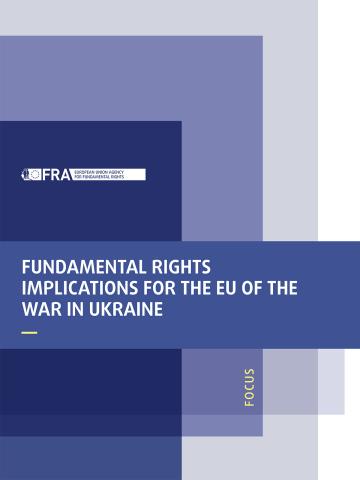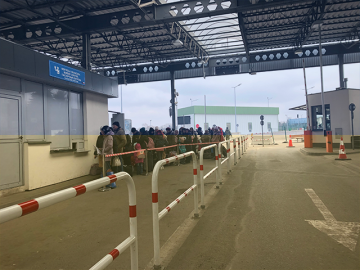It covers the nine EU Member States with the most significant number of displaced persons fleeing the war in Ukraine (as of July 2022), including the four EU Member States bordering Ukraine. The categories are drawn from the European Commission’s Operational guidelines for the implementation of Council Implementing Decision 2022/382. The guidelines aim to help EU Member States with their most pressing questions when implementing the EU Temporary Protection Directive (2001/55/EC). For more detailed information on the national implementation measures across the EU governing temporary protection, see the European Union Agency for Asylum’s dedicated webpage, with comprehensive booklets and maps.
FRA will regularly update this information. It accompanies FRA’s bulletins on “The War in Ukraine – Fundamental Rights Implications within the EU”.
- Bulgaria
-
People eligible for the EU Temporary Protection Directive
- Ukrainian nationals residing in Ukraine before 24 February 2022
- Non-Ukrainian third-country nationals and stateless persons enjoying international protection or equivalent protection in Ukraine before 24 February 2022
- Family members of the above
- Non-Ukrainian third-country nationals and stateless persons with permanent residence in Ukraine before 24 February 2022 whose return to the country of origin is unsafe
Registration of people, including fingerprinting: Yes, without fingerprinting
Access to core rights after granting temporary protection:
- Access to labour market: Yes
- Access to education: Yes
- Access to healthcare: Yes
- Access to social housing: Yes
For more information, see the section on temporary protection of the national web portal for people fleeing the war in Ukraine.
Specific support measures for unaccompanied children: Yes
For more information, see the section on unaccompanied children of the national web portal for the people fleeing the war in Ukraine.
Provision of information: Yes
See also the dedicated portal 'Bulgaria for Ukraine' provided by the government.
Legal basis and entry into force of national implementing measures
- Law on Asylum and Refugees (1 December 2002, last amendment: 26 April 2022 [Articles 39-39a])
- Decision No. 144 R.E. of 10 March 2022 of the Council of Ministers (14 March 2022)
- Czechia
-
People eligible for the EU Temporary Protection Directive
- Ukrainian nationals residing in Ukraine before 24 February 2022
- Ukrainian nationals who entered Czechia legally without a visa or with a short-stay visa before 24 February 2022 and still legally residing there
- Non-Ukrainian third-country nationals and stateless persons enjoying international protection in Ukraine before 24 February 2022
- Family members of the above (meaning the spouse, registered partner, unmarried children and relatives dependent on care and living in the family)
- Non-Ukrainian third-country nationals legally staying (e.g. with visa) in Ukraine before 24 February 2022 and who can prove that their return to their country of origin is not possible due to threat of imminent danger
Registration of people, including fingerprinting: Yes, without fingerprinting
Access to core rights after granting temporary protection:
- Access to labour market: Yes
- Access to education: Yes
- Access to healthcare: Yes
- Access to social housing: Yes
For more information, see the government’s dedicated webpage.
Specific support measures for unaccompanied children: Yes
Provision of information: Yes
See also the dedicated website of the Ministry of the Interior on Information for Ukrainian Citizens.
Legal basis and entry into force of national implementing measures
- Act No. 221/2003 Coll. on temporary protection of foreigners (1 January 2004)
- Act No. 65/2022 Coll. on certain measures in connection with the Russian military invasion in Ukraine (21 March 2022 – in force until 31 March 2023 [but can be extended by the Council of Ministers])
- Germany
-
People eligible for the EU Temporary Protection Directive
- Ukrainian nationals residing in Ukraine before 24 February 2022
- Non-Ukrainian third-country nationals and stateless persons enjoying international protection or equivalent national protection in Ukraine before 24 February 2022
- Family members (as defined in the Council Implementing Decision) of the above
- Non-Ukrainian third-country nationals with permanent residence in Ukraine before 24 February 2022 whose return to the country of origin is unsafe
- Non-Ukrainian third-country nationals who were legally residing in Ukraine on 24 February 2022 for more than a temporary short stay and whose return to the country of origin is unsafe
- Ukrainian nationals already residing in Germany before 24 February 2022 with a residence permit under certain conditions (e.g. residence permits that will soon expire)
- Ukrainian nationals having fled Ukraine shortly before 24 February 2022 or having stayed in another EU Member State shortly before that date (e.g. on holiday or on business)
Registration of people, including fingerprinting: Yes
Access to core rights after granting temporary protection:
- Access to labour market: Yes
- Access to education: Yes
- Access to healthcare: Yes
- Access to social housing: Yes
For more information, see accommodation, employment, and healthcare
Specific support measures for unaccompanied children: Yes
Provision of information: Yes
See also the Federal Ministry of the Interior information portal ‘Germany 4 Ukraine’ and the Federal Office for Migration and Refugees website.
Legal basis and entry into force of national implementing measures
- Residence Act, Section 24 (28 August 2007 – latest amendments: 1 June 2022)
- Ordinance of the Federal Ministry of the Interior on temporary exemption from the requirement to hold a residence permit for persons displaced from Ukraine (9 March 2022 – but applied retroactively from 24 February 2022)
- Hungary
-
People eligible for the EU Temporary Protection Directive
- Ukrainian nationals fleeing after 24 February 2022 (including Hungarian-Ukrainian dual nationals mainly living in Zakarpatska Oblast)
- Non-Ukrainian third-country nationals and stateless persons enjoying international protection or equivalent national protection in Ukraine before 24 February 2022
- Family members (as defined in the Council Implementing Decision) of the above
[Non-Ukrainian third-country nationals with permanent residence in Ukraine before the war only receive a ‘certificate for temporary stay’ (ideiglenes tartózkodasra jogosító igazolás)– valid for 30 days and subject to prolongation up until six months]
Registration of people, including fingerprinting: Yes. No registration for Hungarian-Ukrainian dual nationals; fingerprinting applies only to those older than 14 years of age.
Access to core rights after granting temporary protection:
- Access to labour market: No*
- Access to education: Yes
- Access to healthcare: Yes
- Access to social housing: Yes
For more information, see Ukran2022.
Specific support measures for unaccompanied children: Yes
Provision of information: Yes
Also available online on the web page of the National Directorate-General for Aliens Policing.
Legal basis and entry into force of national implementing measures
- Act No. LXXX of 2007 on Asylum (Chapter V) and its implementing Government Decree No. 301/2007 (Chapter VIII) (1 January 2008)
- Government Decree No. 86/2022 (8 March 2022)
- Government Decision No. 1179/2022 (23 March 2022)
- Government Decree No. 121/2022 (29 March 2022)
- Government Decision No. 1186/2022 (29 March 2022)
- Government Decree No. 246/2022 (9 July 2022)
- Italy
-
People eligible for the EU Temporary Protection Directive
- Ukrainian nationals residing in Ukraine before 24 February 2022
- Non-Ukrainian third-country nationals and stateless people enjoying international protection or equivalent national protection in Ukraine before 24 February 2022 displaced after that date
- Family members (as defined in the Council Implementing Decision) of the above
- Non-Ukrainian third-country nationals with permanent residence in Ukraine before 24 February 2022 whose return to the country of origin is unsafe
Registration of people, including fingerprinting: Yes
Access to core rights after granting temporary protection:
- Access to labour market: Yes
- Access to education: Yes
- Access to healthcare: Yes
- Access to social housing: Yes
For more information, see the website Ukraine emergency and information for students arriving from Ukraine.
Specific support measures for unaccompanied children: Yes
For more information, see the plan adopted by the Commissioner for the coordination of assistance to unaccompanied children from Ukraine.
Provision of information: Yes
See also the Ministry of the Interior page on ‘Useful information for the entry of Ukrainian refugees to Italy’.
Legal basis and entry into force of national implementing measures
- Poland
-
People eligible for the EU Temporary Protection Directive
EU temporary protection:
- Ukrainian nationals fleeing after 24 February 2022 [obtaining an identification number in the electronic civil registry (PESEL number) upon registration]
- Non-Ukrainian third-country nationals and stateless persons enjoying international protection in Ukraine before 24 February 2022
- Family members (as defined in the Council Implementing decision) of the above [spouses of Ukrainian nationals also obtain a PESEL number upon registration]
- Non-Ukrainian third-country nationals with permanent residence in Ukraine before the war, whose return to the country of origin is unsafe
National protection scheme:
- Ukrainian nationals (and their spouses) coming from Ukraine before 24 February 2022
- Other people within the meaning of Article 2 (1) (b)-(c) of the Council Implementing Decision can receive temporary protection under the 2003 Act on granting protection to foreigners
Registration of people, including fingerprinting: Yes, fingerprinting only applies to those issued a PESEL number.
Access to core rights after granting temporary protection:
- Access to labour market: Yes
- Access to education: Yes
- Access to healthcare: Yes
- Access to social housing: Yes
For more information, see employment, healthcare, and education.
Specific support measures for unaccompanied children: Yes**
See also a leaflet informing unaccompanied children about the risks of human trafficking.
Provision of information: Yes
The government launched the Website for citizens of Ukraine, and another for Non-Ukrainian third-country nationals .
Legal basis and entry into force of national implementing measures
- Act on granting protection to foreigners (13 June 2003)
- Special Act on assistance to Ukrainian nationals (12 March 2022)
- Amendments to the Special Act on assistance to Ukrainian nationals (23 March 2022)
- Amendments to the Special Act on assistance to Ukrainian nationals (23 March 2022)
- Romania
-
People eligible for the EU Temporary Protection Directive
- Ukrainian nationals (including those who arrived before 24 February 2022)
- Non-Ukrainian third-country nationals and stateless persons enjoying international protection or equivalent national protection in Ukraine before 24 February 2022
- Non-Ukrainian third-country nationals and stateless persons who were permanent residents in Ukraine before 24 February 2022 and whose return to the country of origin is unsafe
- Family members of the above as per the Council Implementing Decision (excluding unmarried partners)
Registration of people, including fingerprinting: Yes, without fingerprinting, only facial image captured
Access to core rights after granting temporary protection:
- Access to labour market: Yes
- Access to education: Yes***
- Access to healthcare: Yes
- Access to social housing: Yes
For more information, see employment, healthcare, and education.
Specific support measures for unaccompanied children: Yes
Provision of information: Yes
Also available online on the General Inspectorate for Immigration web page.
Legal basis and entry into force of national implementing measures
- Law No. 122/2006 on asylum in Romania, Chapter IX [Temporary Protection] (16 August 2006)
- Government Decision No. 337/2022 (12 March 2022)
- Government Decision No. 367/2022 (18 March 2022)
- Emergency Ordinance No. 15/2022 (27 February 2022), as amended on 5 March 2022, 7 March 2022, 11 March 2022 and 23 March 2022
- Government Decision No. 277/2022 doubling allowances for applicants for international protection (27 February 2022)
- Order of the Minister of Education No. 3.325/02.03.2022 on students’ mobility (3 March 2022)
Other ministerial instructions and emergency ordinances not listed here.
- Slovakia
-
People eligible for the EU Temporary Protection Directive
Ukrainian nationals and their non-Ukrainian relatives, specifically:
- wife/husband of Ukrainian nationals
- minor children of Ukrainian nationals or minor children of their spouse
- parents of a minor child, who is a Ukrainian national
- dependent members of their households
Non-Ukrainian nationals who were granted:
- permanent residence in Ukraine before 24 February and whose return to the country of origin is unsafe
- international protection in Ukraine before 24 February 2022 and their family members residing in Ukraine before 24 February 2022
Registration of people, including fingerprinting: Yes, fingerprinting applies only to non-Ukrainian third-country nationals and stateless persons.
Access to core rights after granting temporary protection:
- Access to labour market: Yes
- Access to education: Yes
- Access to healthcare: Yes
- Access to social housing: No
For more information, see employment, healthcare, and education.
Specific support measures for unaccompanied children: Yes
Provision of information: Yes
See also the government information portal for Ukrainians entering Slovakia.
Legal basis and entry into force of national implementing measures
- Act No. 55/2022 Coll. on certain measures in relation to the situation in Ukraine (25 February 2022)
- Government decree on the provision of temporary refuge according to § 29 (2) of Act No. 480/2002 Coll. on asylum (28 February 2022)
- Government decree of 16 March 2022 transposing the Council Implementing Decision (17 March 2022)
- Lex Ukraine (30 March 2022)
- Lex Ukraine 3 (7 June 2022)
- Spain
-
People eligible for the EU Temporary Protection Directive
- Ukrainian nationals having legally stayed in Spain before 24 February 2022, who, as a result of the armed conflict, cannot return to Ukraine
- Non-Ukrainian third-country nationals and stateless persons who legally resided in Ukraine on the basis of a valid residence permit (whether permanent or otherwise) and who cannot return to their country of origin
- Family members of the above (including spouses and unmarried partners, minor unmarried children; and other close relatives living together as part of the family unit and completely or mainly dependent on them)
- Ukrainian nationals who were in an irregular situation in Spain before 24 February 2022 and who, as a result of the armed conflict, cannot return to Ukraine
Registration of people, including fingerprinting: Yes, fingerprinting applies only to non-Ukrainian third-country nationals and stateless persons.
Access to core rights after granting temporary protection:
- Access to labour market: Yes
- Access to education: Yes
- Access to healthcare: Yes
- Access to social housing: Yes
For more information, see employment, healthcare, and education.
Specific support measures for unaccompanied children: Yes
Provision of information: Yes
See also the Ministry of the Interior's dedicated page on temporary protection of displaced persons from Ukraine.
Legal basis and entry into force of national implementing measures
- Royal Decree No. 1325/2003 of 24 October (26 October 2003)
- Order of the Ministry of the Presidency, Relations with Parliament and Democratic Memory No. PCM/169/2022 (10 March 2022)
- Order of the Ministry of the Presidency, Relations with Parliament and Democratic Memory No. PCM/170/2022 (10 March 2022)
* Access to labour market – under same conditions as non-EU nationals [work permit needed], with some exceptions for healthcare workers.
** Special support measures for unaccompanied children fleeing the war from Ukraine are only partially in place in Poland.
*** Access to education includes both the Romanian national education system as well as the possibility to continue their schooling in the Ukrainian system.








